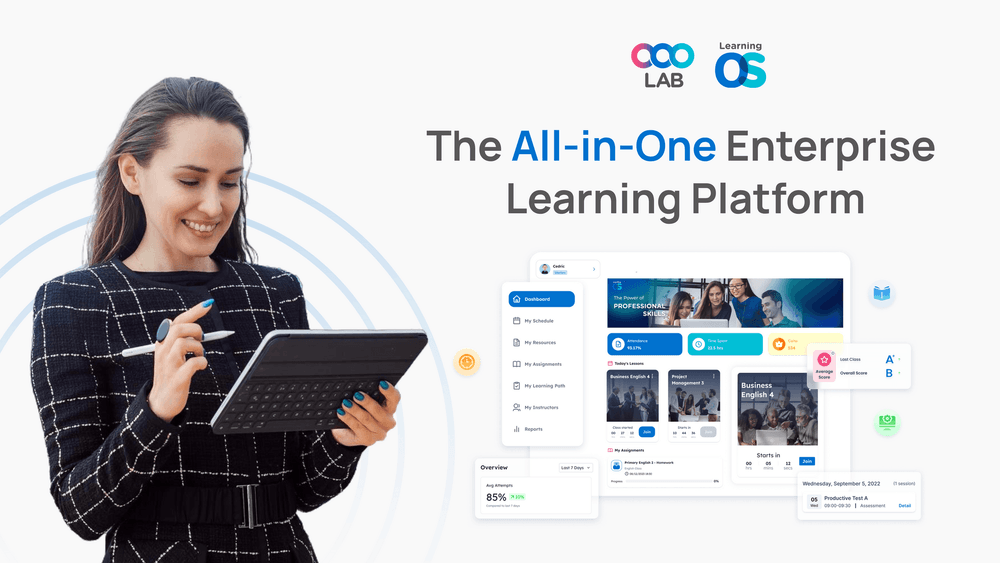

B2B sales are characterized by complex, extended sales cycles that often span months or even years. These long cycles involve multiple stakeholders, intricate decision-making processes, and high-value deals, making effective sales training essential for success. An enterprise LMS provides a scalable, centralized platform to deliver tailored sales training that equips reps to navigate these challenges with confidence and precision.
This blog explores strategies for sales training to help B2B sales teams manage long sales cycles, supported by data-driven insights. We will highlight how an enterprise LMS empowers reps to build relationships, maintain momentum, and close deals efficiently.

B2B sales cycles are inherently longer than B2C due to higher stakes, larger budgets, and multiple decision-makers, such as C-suite executives, procurement teams, and end-users. According to a 2024 Salesforce report, the average B2B sales cycle lasts 6 to 9 months, with 30 percent extending beyond a year. Sales training is critical to prepare reps for the patience, persistence, and strategic thinking required to succeed.
An enterprise LMS enhances this process by delivering sales training that addresses the nuances of B2B selling, ensuring reps are equipped to handle prolonged timelines and complex negotiations.
>>> Read more: Sales Training Demystified: Why It Matters More Than Ever
>>> Read more: Effective Onboarding Strategies for New Sales Hires: Setting Them Up for Success
To succeed in long B2B sales cycles, organizations must implement targeted sales training strategies using an enterprise LMS. Below are key approaches to empower sales teams.
B2B deals involve multiple stakeholders, each with distinct needs. Sales training should teach reps to map decision-makers—such as influencers, gatekeepers, and champions—and tailor their approach. An enterprise LMS can deliver modules on identifying stakeholder roles and crafting personalized pitches.
A 2024 McKinsey study found that stakeholder-focused training increases win rates by 25 percent. This strategy ensures reps engage the right people effectively.
Long sales cycles require building trust through consultative selling. Sales training via an enterprise LMS should emphasize active listening, needs assessment, and solution alignment. For example, reps might learn to position a product as a strategic investment for a CFO.
Training in consultative selling helps reps foster relationships, maintaining prospect interest over extended periods.
B2B prospects often raise technical or financial objections. Sales training should include role-playing scenarios to practice addressing concerns, such as budget constraints or integration challenges. An enterprise LMS hosts these simulations, providing feedback to refine responses.
A 2023 Gartner report notes that objection-handling training boosts confidence by 40 percent. This prepares reps to keep deals on track.
Maintaining momentum is critical in long sales cycles. Sales training should teach reps to nurture prospects through regular touchpoints, such as sharing case studies or industry insights. An enterprise LMS can deliver modules on effective follow-up strategies and content personalization.
Consistent nurturing builds trust, ensuring prospects remain engaged until the deal closes.
Long sales cycles demand continuous learning to stay sharp. Microlearning—short, 5- to 10-minute modules—delivers sales training on topics like negotiation or competitive positioning. An enterprise LMS enables on-demand access, fitting into busy schedules.
A 2024 Deloitte report found that microlearning improves skill retention by 20 percent. This keeps reps agile throughout extended deals.
B2B sales rely heavily on CRM platforms like Salesforce to track interactions. An enterprise LMS integrated with CRM systems delivers sales training within workflows, such as prompting a module on upselling before a key meeting. This ensures training is timely and relevant. Integration streamlines enablement, helping reps manage long cycles efficiently.
Analytics are essential for refining sales training. An enterprise LMS tracks metrics like training completion, deal progression, and close rates, helping managers identify gaps. For instance, if reps struggle with stakeholder engagement, trainers can enhance sales training in that area.
Data ensures training aligns with the demands of long sales cycles, maximizing effectiveness.
Book Free Demo with us. Bring your Training and Learning to a new height with LearningOS.

>>> Read more: Building Confidence in Your Sales Team Through Training and Development
>>> Read more: Addressing declining retail foot traffic issue
Using an enterprise LMS for sales training delivers significant benefits for B2B teams:
Higher Win Rates: Stakeholder-focused training improves deal success.
Sustained Momentum: Nurturing skills keep prospects engaged.
Confidence: Objection-handling practice empowers reps.
Scalability: The LMS supports distributed teams seamlessly.
Efficiency: Microlearning and CRM integration save time.
These benefits drive revenue and ensure reps excel in complex B2B environments.
>>> Read more: A guide to teaching sales rep positive response
>>> Read more: Why is employee upskilling non-negotiable for business success
Navigating long B2B sales cycles requires specialized sales training that empowers reps to engage stakeholders, handle objections, and maintain momentum. An enterprise LMS delivers scalable, data-driven sales training to meet these demands, driving win rates and revenue. From microlearning to CRM integration, these strategies ensure reps thrive in complex deals.
Invest in sales training today to transform your B2B sales team. With an enterprise LMS, your reps will master long sales cycles and deliver lasting success.
At OOOLAB (pronounced 'uːlæb'), our mission is to make complex learning operations simple. We aim to positively impact the lives of over 1,000,000 learners and educators by the end of 2026.
OOOLAB's LearningOS provides educational institutions and corporate enterprises with an all-in-one solution to create and deliver engaging learning experiences.
We meet organizations' needs or support your growth. We provide undivided attention. We provide:
1. Dedicated success manager: We offer direct communication with a real human who'll discuss your enterprises unique learning operations and goals.
2. Personalized setup: Our team will help you transition to LearningOS on your schedule, one step at a time.
3. Around the clock support: Get help from us any time, and in any time zone.
We have recently launched a new AI training tool, Skill Quotient OS, designed to elevate hybrid training to new heights. It offers role-play exercises with scenarios and assessments.This tool can apply in sales training, corporate development and customer support training in any industry.
Reach out to us at: LinkedIn, Facebook, Instagram, Tiktok, X
1. What are the main benefits of LearningOS
Our platform is easy to use and automates all aspects of your learning operations. It efficiently manages complex tasks, allowing you to concentrate on delivering exceptional learning experiences.
2. What main features does LearningOS offer?
Our all-in-one software solution combines a Content Management System, a Learning Management System, content authoring tools, and a mobile friendly Learner Portal.
3. Can your platform be used for corporate enterprises?
Absolutely! LearningOS is an Enterprise LMS that is a great fit for corporate learning. In fact, we have clients with up to 700,000 employees using LearningOS! Upskill your workforce by creating and assigning interactive eLearning content while effortlessly tracking employee progress.
4. Who currently uses your platform?
Our platform is currently used by over 120,000+ learners, parents, and employees across 21 countries worldwide!
5. What types of content options are available on your platform?
We offer ready-to-go curriculums for various educational purposes or our expert design team can build a custom course for you. We can also upload your existing learning materials and enhance them digitally.
6. What is unique about LearningOS?
Our platform, designed by educators for educators, provides you with all the tools you need to scale. Build and promote your own hybrid and blended learning courses and save money on licensing fees by owning your own proprietary content.
7. How can I get started?
Schedule a meeting with our experts and we’ll talk about how our platform can address your unique challenges and help to grow your business.